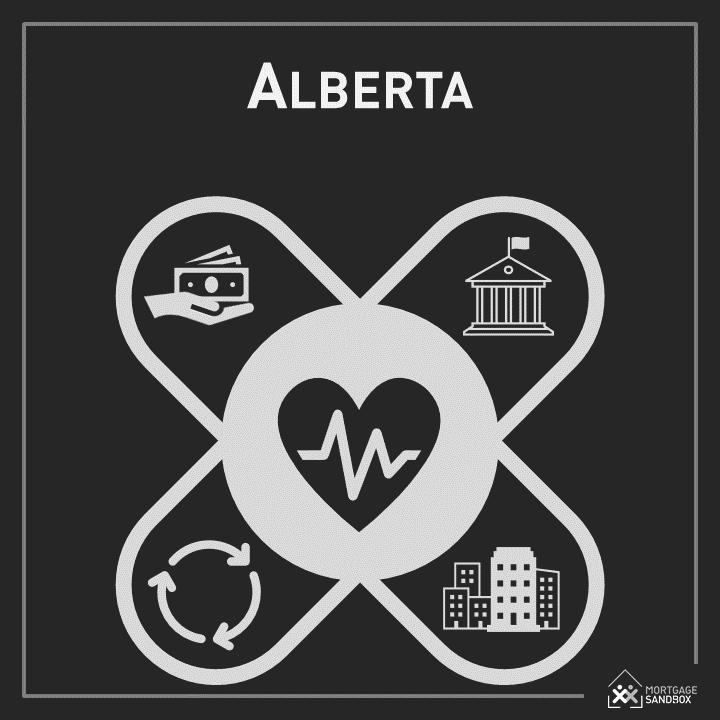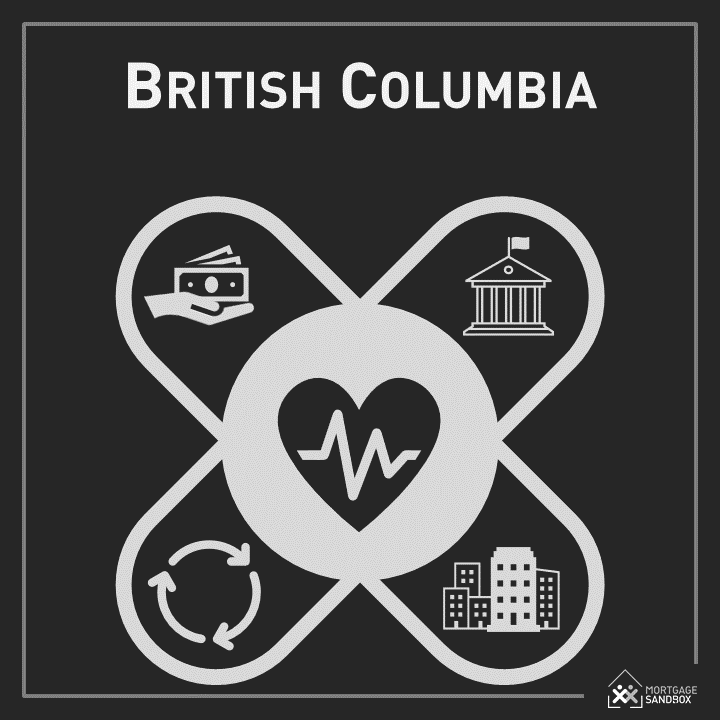5 Forces Driving Alberta Home Prices
At the highest level, supply and demand set house prices and all other factors simply drive supply or demand. At Mortgage Sandbox, we have created a five-factor framework for gathering information and performing our market analysis. The five key factors are affordability, capital flows, government policy, supply, and popular sentiment.
In the long-run, the market is fundamentally driven by economic forces, but in the short-run, sentiment can drive prices beyond economically sustainable levels.
At the moment, real estate prices in Alberta are dropping, and the market is weak. Here is why the market is vulnerable and likely to stay that way.
1. Affordability
Affordability is a function of:
Home Price Changes: Changes in the market value of the desired home.
Savings-Equity: How much disposable after-tax income you’ve been able to squirrel away plus any equity you have in your existing home.
Financing: Your maximum mortgage is calculated using income (i.e., how much money you can put toward mortgage payments) and interest rates (how big are the mortgage payments).
How have these changed lately?
Home Price Changes
From the peak, prices have dropped 9 to 21% depending on where you’re looking and what type of home you want. Lower prices improve affordability, and improved affordability should add upward pressure on prices.
Savings-Equity
Rents have risen in line with incomes (1.7%), and vacancy rates are running at a healthy 3.9%, so first-time buyers were able to save for a down payment.
On the downside, anyone who invested their future down payment in the stock market may now find out they’ll need to save for a few more years.
In the short-run, home prices will drop, and this will reduce homeowner equity. This decline in home equity makes it more difficult for people in ‘starter homes’ to move up the housing ladder.
With the Coronavirus containment efforts, the banning of evictions, the conversion of AirBnBs into long-term rentals, and a halt to immigration, we believe rents will drop. That will allow renters to save more toward a future purchase when the market thaws.
Financing
Median incomes have not changed materially, but employment levels are dropping. To mitigate the impact, the Bank of Canada has reduced rates dramatically, but mortgage qualifying interest rates have not fallen nearly as much.
Lower interest rates were a significant factor driving up home prices between 2018 and 2019.
Job losses from Coronavirus containment efforts are a more powerful force than low mortgage rates. Without income, you can not qualify for a mortgage. Alberta’s oil-dependent economy has been hit hard.
Canada shed nearly two million jobs in April, as the novel coronavirus pandemic tore through the Canadian economy. The official unemployment rate soared to 13% but it would have been 17.8% if the agency had included the 1.1 million Canadians who stopped looking for work — likely because the COVID-19 economic shutdown has limited job opportunities.
We expect the Coronavirus Recession to drag out at least until the end of 2020. Click here to find out why there is likely to be another wave of infections and a corresponding lock-down.
Overall Affordability
Overall, due to the impacts of the Coronavirus, homes are much less affordable than they were in 2019. The charts below are based on 2016 household income levels and they illustrate the affordability levels before the Coronavirus pandemic struck.
2. Capital Flows
These represent short-term investment, long-term investment, and recreational demand (i.e., homes not occupied full-time by the owner). Here is where foreign capital, real estate flippers, and dark money come into play. It also includes short-term rentals, long-term rentals, and recreational property purchases.
Capital inflows raise demand and put upward pressure on prices while capital outflows have the opposite effect. If capital sits invested in real estate and nothing is bought or sold, it does not affect on the direction of prices.
Foreign Capital
Before the Coronavirus, the Canadian Association of Petroleum Producers predicted that capital spending would drop again for a fifth consecutive year in 2020. They felt activity would not improve without better market access via pipelines and construction of the Trans Mountain Pipeline is likely a long way from completion.
Foreign capital inflows have been a significant influence in Vancouver and Toronto and the travel bans are expected to have a high impact on those markets. This is less of a concern in Calgary because, in recent years, real estate has been less dependent on foreign capital.
Long-term Rental Investors
As it relates to our analysis, we expect domestic interest in long-term rental income properties will dry up so long as Coronavirus eviction bans are in place. The government has not developed an exit strategy for landlords with rent arrears when social isolation policies are lifted. How will tenants repay three to six months of rent arrears?
As well, recent reports of rents falling across Canada will discourage new rental investment until rental rates stabilize.
Rental investors will simply try to time any future property purchases for the end of the Coronavirus containment period, and they will avoid properties with tenants who have outstanding rent arrears.
Short-term Rental Hosts
We are watching short-term rentals closely because travel bans will effectively shut down short-term rentals for the next few months (Canada’s tourist high season).
In May 2019, Edmonton counted 2,146 registered short-term rentals. 63 percent were ‘commercial operators’ renting the entire home. In September 2019, Calgary city staff estimate there are 6,000 short-term rentals within the city limits.
In Edmonton, the short-term rentals that survive the Coronavirus slow-down will then face new bylaws requiring business licenses for short-term rentals. This will allow the city to manage these businesses better and potentially suspend licenses for hosts with too many noise complaints. Calgary has implemented similar bylaws. It doesn’t appear that these rules will have a large impact on the short-term rental industry.
Dark Money
Dark money is the proceeds of crime or money that is transferred to Canada illegally. This includes money earned legitimately that is illegally transferred from countries with capital controls (e.g., China) and legitimate earnings moved from countries who are the subject of international sanctions (e.g., Iran, Russia, and North Korea).
In order to hide the illegal nature of the funds, it is laundered in the real estate market. Sometimes the true owner of the property is hidden by using a Straw Buyer and other times the property is owned by a shell company.
Sometimes a real estate agent or lawyer will accept the illegal cash to help the nefarious individuals hide its true origins. In 2015, a B.C. realtor was caught with hundreds of thousands of dollars in her closet, at home.
We see no evidence of a diminished role for dark money in Alberta’s real estate.
Summary of Capital Flows
In the medium-term, we expect a dramatic drop in capital flowing into Alberta’s real estate.
3. Government Policy
Governments were trying to engineer a ‘soft landing’, but now they are trying to protect against a housing crash by encouraging banks to allow borrowers to defer their mortgage payments up to six months.
COVID-19 Support Measures
Mortgage Payment Deferral
A mortgage deferral is an agreement between the borrower and the lender to pause or suspend mortgage payments for a certain amount of time.
After the agreement ends, your mortgage payments return to normal. The mortgage payment deferral does not cancel, erase, or eliminate the amount owed on your mortgage. The borrower still accrues interest that will have to be paid.
A Canadian with a $250,000 mortgage who defers their mortgage by six months adds approximately $4,000 in accrued interest to their mortgage balance.
Eviction Bans and Suspensions
The Alberta government has suspended the enforcement of evictions indefinitely and Residential Tenancy Dispute Resolution Service (RTDRS) will not issue any new eviction orders until further notice. Sheriff’s offices have been asked to postpone any scheduled enforcement of eviction orders.
4. Supply
Supply comes from two sources.
Existing sales: Existing home sales are sales of ‘used homes’. They are homes owned by individuals who sell them to upgrade, to move for work, or some other reason. The Toronto Real Estate Board only reports existing home sales and listings.
Pre-Sales and Construction Completions: Most new homes are sold via pre-sales before the construction has started. These are predominantly apartments and townhomes. Data on pre-sales is private and difficult to find, but construction starts (reported by the government) are a very accurate lagging indicator of pre-sale activity.
Rising supply releases the upward pressure on prices caused by demand.
Months of Supply of Existing Homes
Spring is traditionally the busy season for real estate activity; however, this year, it will be more challenging to buy homes with social distancing measures.
Only motivated sellers will sell during a pandemic, while a majority of willing buyers will be sidelined by employment and savings concerns.
Coronavirus mortality and hospitalization rates (short-term impact)
We know that older Canadians are more vulnerable, and the fatality rates follow a pretty clear trend:
People aged 80 and up have an expected 14.8 percent mortality rate
8 percent of those 70 to 79 succumb to it
3.5 percent of 60 to 69 year-olds are likely to pass away
In 2020, 45% of baby boomers will be over 65 years old. In Calgary, roughly 11% of the population is over 65 years old, and in Edmonton, approximately 12% of the population is over 65. In Fort McLeod and Pincher Creek, more than 20% of residents are in their golden years.
Obesity is also a COVID-19 risk factor, and 29% of Alberta residents are obese.
The Coronavirus could cause an unusually large number of homes to come to market in areas favoured by retirees. Real estate prices in these areas may be particularly vulnerable.
Coronavirus short-term rentals sold or converted (short-term impact)
Travel bans will effectively shut down short-term rentals for the next few months (Canada’s tourist high season). The drop in bookings may force many owners of apartments primarily used as short-term rentals to sell their condo or repurpose it for long-term rentals adding up to 8,000 homes to the market in the next six months.
We surveyed over 50 Canadian real estate agents, and 50% had observed a majority of short-term rentals were being listed as long-term furnished apartment rentals, and 25% of agents expected most short-term rentals they would be sold.
We are already seeing the impact of these homes joining the long-term rental market.
Mortgage Delinquencies and Foreclosures
The most recent data indicates that more Canadians are missing their monthly payments, and job growth has been healthy. Some economists have been warning of a recession, and even without a recession, it appears more Canadians are over-extending themselves. Surprisingly, the increases in delinquencies are led by Ontario and British Columbia, and not Alberta.
According to Equifax, the credit bureau company:
“Mortgage delinquencies have also been on the rise. The 90-day-plus delinquency rate for mortgages rose to 0.18 percent, an increase of 6.7 percent from last year. Ontario (17.6%) led the increases in mortgage delinquency followed by British Columbia (15.6%) and Alberta (14.8%). The most recent rise in mortgage delinquency extends the streak to four straight quarters.”
A recent survey by MNP reported a staggering number of Canadians are stretched to their limits:
“Over 30 per cent of Canadians say they’re concerned that rising interest rates could push them close to bankruptcy, according to a nationwide survey conducted by Ipsos on behalf of MNP, one of the largest personal insolvency practices in the country.”
Job losses from Coronavirus containment will worsen this situation. Although the CMHC can help Canadians via Canadian lenders offers options to defer payments, re-amortize mortgages, add interest arrears to your mortgage balances. It will not help overextended Canadians from their credit card debt nor will it protect Canadians who chose to finance their homes with private mortgage lenders. Many Albertans turned to private mortgage lenders to help them through recent economic tough times, and those private lenders may get cold feet and ask to be repaid as the Coronavirus crisis unfolds.
Baby Boomers Downsizing?
According to a recent survey, 44 percent of Alberta Boomers who own a home plan to downsize in the retirement and 45 percent would consider a condo apartment for their next purchase. Another survey from RBC says, “Over the coming decade, we expect baby boomers to ‘release’ half a million homes they currently own—the result of the natural shrinking of their ranks, and their shift to rental forms of housing, such as seniors’ homes, for health or lifestyle reasons.”
As baby boomers begin downsizing and list their large and expensive homes for sale, they will add supply in what is considered the luxury market. If not enough Gen-X and millennial buyers are to buy these expensive homes, there is a risk that this may depress prices at the top of the market, which will then compress prices for townhomes and condo apartments.
Baby boomers banking on selling their home to finance their retirement may be best served by selling during the pandemic since there is no telling how long it will take for prices to return to current levels.
Overall Existing Supply
In the near-term, we expect a lot of supply to come to the market, and in the medium-term, there are risks of excess housing supply.
Pre-sales and Completions
New Construction:
There is a record number of homes under construction, and many are nearing completion. As these buildings complete later in 2020 and 2021, and people move out of their rental or sell their current home, this new supply should alleviate some of the pressure in the market.
There is also a possibility that many people who bought pre-sales will no longer qualify for mortgages when the buildings complete. In this case, those pre-sold units will be resold on the market.
Pre-sales:
Pre-sales, which are purchases of brand-new homes from developers, are measured using housing starts. Developers need to sell at least 70% of a project to secure financing and begin construction, so the start of construction is an indication of successfully pre-selling the project.
Pre-sales will trend down as showrooms close during the pandemic. When social distancing measures are lifted, developers will likely try to entice buyers with price discounts, move-in allowances, and cool amenities.
Popular Sentiment
It’s challenging to anticipate popular sentiment, but as witnessed in the past two years, sentiment can shift quickly.
If hospitalizations in Alberta continue to rise, then we can expect sentiment to worsen. In the short-term, we expect buyers will hold back while many sellers will move forward.
Find out where prices are headed in Alberta
Like this report? Like us on Facebook.





